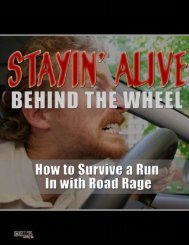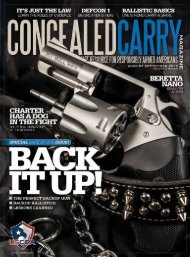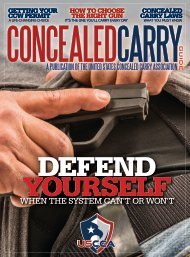Download This Issue - US Concealed Carry
Download This Issue - US Concealed Carry
Download This Issue - US Concealed Carry
Create successful ePaper yourself
Turn your PDF publications into a flip-book with our unique Google optimized e-Paper software.
Whatever you do, keep your co<br />
your temper… If you lose your<br />
will also be close to losing con<br />
BOOK REVIEW:<br />
How to Win<br />
A Gunfight<br />
by Tony Walker<br />
[ B Y R E V . D A V I D B E E S O N ]<br />
idea is to keep control of the s<br />
Short and Sweet:<br />
The first thing I noticed<br />
about Tony Walker’s book<br />
How to Win A Gunfight is<br />
its length.<br />
At slightly fewer than 100 pages, it<br />
is much shorter than most gun<br />
books. What a relief! While no gun<br />
book can cover the entire subject, that<br />
doesn’t keep a lot of authors from trying.<br />
Some people want to learn more about<br />
gunfighting, but they don’t want to read<br />
a book 250-350 pages long. Enter: How<br />
to Win A Gunfight.<br />
Walker opens the book with a great<br />
statement about awareness: “Although<br />
many crime victims have claimed that<br />
their attacker ‘appeared out of nowhere,’<br />
this is simply not the case….What really<br />
happened was that the victim was<br />
totally unaware of what was going on<br />
around him.” (p. 5).<br />
Chapter Two covers the psychological<br />
and physiological changes that occur in<br />
an armed confrontation. He mentions<br />
adrenaline increase, fine motor skills<br />
degradation, and the Tachy-Psyche<br />
Effect. Walker goes on to discuss “psychological<br />
domination,” commonly<br />
known as command voice. He recommends<br />
shouting “No!” to your adversary.<br />
<strong>This</strong> does two things. First, it alerts<br />
others to your predicament. Second, it<br />
lets the assailant know you are not going<br />
to be a victim. Chapter Three focuses on<br />
stress management.<br />
The Half Second<br />
Advantage<br />
Chapter Four addresses reaction<br />
times and how to decrease them. In the<br />
following section, Walker lists several<br />
ways to gain “the half second advantage.”<br />
One is particularly ingenious. He<br />
lays out the scenario: someone walks<br />
up to you and demands your wallet.<br />
As you comply and begin reaching for<br />
it, you clearly say, “Listen, I want to tell<br />
you something.” <strong>This</strong> puts the attacker<br />
into “receive mode” as he waits to hear<br />
what you have to say. <strong>This</strong> split-second<br />
delay will allow you to do whatever you<br />
feel necessary: go for your gun (instead<br />
of your wallet), turn to run, etc. Another<br />
neat suggestion involves a little foreign<br />
language. If someone approaches you<br />
and asks for money, respond in another<br />
language and tell them you don’t understand.<br />
While that person is processing<br />
what you just said, you can again take<br />
whatever action you deem necessary.<br />
In Chapter Six, Walker discusses verbal<br />
altercations and makes a good point<br />
about temper. “Whatever you do, keep<br />
your cool. Don’t lose your temper… If<br />
you lose your temper, you will also be<br />
close to losing control, and the idea<br />
is to keep control of the situation.” (p.<br />
31). <strong>This</strong> is an excellent point, but few<br />
mention it. A lot of writers focus on<br />
mindset, but don’t entertain the idea<br />
that you might go too far, get ticked<br />
off, and make the situation worse. You<br />
must be levelheaded when you carry a<br />
firearm! Walker also mentions Ayoob’s<br />
“cash stash.” If you need to deescalate a<br />
situation, give the other guy a few bucks<br />
and invite him to have a burger on you.<br />
Will you lose a few dollars? Yes. Will you<br />
avoid a potentially dangerous situation?<br />
Possibly. It’s worth a few dollars to try.<br />
Walker suggests that you learn how to<br />
count your shots to avoid running your<br />
gun dry. He is the first firearms instructor<br />
I have heard of who suggests this. I<br />
believe the consensus is that it would<br />
be too difficult under the stress of a<br />
gunfight. Extreme stress distorts our<br />
perception of time, gives us tunnel vi-<br />
24<br />
<strong>US</strong>CONCEALEDCARRY.COM n CONCEALED CARRY MAGAZINE n JULY 2008
















